The Rolling Stones | ||
| Allmusic Biography : By the time the Rolling Stones began calling themselves the Worlds Greatest Rock & Roll Band in the late 60s, they had already staked out an impressive claim on the title. As the self-consciously dangerous alternative to the bouncy Merseybeat of the Beatles in the British Invasion, the Stones had pioneered the gritty, hard-driving blues-based rock & roll that came to define hard rock. With his preening machismo and latent maliciousness, Mick Jagger became the prototypical rock frontman, tempering his macho showmanship with a detached, campy irony while Keith Richards and Brian Jones wrote the blueprint for sinewy, interlocking rhythm guitars. Backed by the strong yet subtly swinging rhythm section of bassist Bill Wyman and drummer Charlie Watts, the Stones became the breakout band of the British blues scene, eclipsing such contemporaries as the Animals and Them. Over the course of their career, the Stones never really abandoned blues, but as soon as they reached popularity in the U.K., they began experimenting musically, incorporating the British pop of contemporaries like the Beatles, the Kinks, and the Who into their sound. After a brief dalliance with psychedelia, the Stones re-emerged in the late 60s as a jaded, blues-soaked hard rock quintet. They had always flirted with the seedy side of rock & roll, but as the hippie dream began to break apart, they exposed and reveled in the new rock culture. It wasnt without difficulty, of course. Shortly after he was fired from the group, Jones was found dead in a swimming pool, while at a 1969 free concert at Altamont, a concertgoer was brutally killed during a Stones show. But the Stones never stopped going. For the next 50-plus years, they continued to record and perform, and while their records werent always blockbusters, they were never less than the most visible band of their era -- certainly, none of their British peers continued to be as popular or productive as the Stones. And no band since has proven to have such a broad fan base or such far-reaching popularity, and it is impossible to hear any of the groups that followed them without detecting some sort of influence, whether it was musical or aesthetic. Throughout their career, Mick Jagger (vocals) and Keith Richards (guitar, vocals) remained at the core of the Rolling Stones. The pair initially met as children at Dartford Maypole County Primary School. They drifted apart over the next ten years, eventually making each others acquaintance again in 1960, when they met through a mutual friend, Dick Taylor, who was attending Sidcup Art School with Richards. At the time, Jagger was studying at the London School of Economics and playing with Taylor in the blues band Little Boy Blue & the Blue Boys. Shortly afterward, Richards joined the band. Within a year, they had met Brian Jones (guitar, vocals), a Cheltenham native who had dropped out of school to play saxophone and clarinet. By the time he became a fixture on the British blues scene, Jones had already had a wild life. He ran away to Scandinavia when he was 16 and had already fathered two illegitimate children. He returned to Cheltenham after a few months, where he began playing with the Ramrods. Shortly afterward, he moved to London, where he played in Alexis Korners group, Blues Inc. Jones quickly decided he wanted to form his own group and advertised for members; among those he recruited was the heavyset blues pianist Ian Stewart. As he played with his group, Jones also moonlighted under the name Elmo Jones at the Ealing Blues Club. At the pub, he became reacquainted with Blues, Inc., which now featured drummer Charlie Watts, and, on occasion, cameos by Jagger and Richards. Jones became friends with Jagger and Richards, and they soon began playing together with Taylor and Stewart; during this time, Mick was elevated to the status of Blues, Inc.s lead singer. With the assistance of drummer Tony Chapman, the fledgling band recorded a demo tape. After the tape was rejected by EMI, Taylor left the band to attend the Royal College of Art; he would later form the Pretty Things. Before Taylors departure, the group named itself the Rolling Stones, borrowing the moniker from a Muddy Waters song. The Rolling Stones gave their first performance at the Marquee Club in London on July 12, 1962. At the time, the group consisted of Jagger, Richards, Jones, pianist Ian Stewart, drummer Mick Avory, and Dick Taylor, who had briefly returned to the fold. Weeks after the concert, Taylor left again and was replaced by Bill Wyman, formerly of the Cliftons. Avory also left the group -- he would later join the Kinks -- and the Stones hired Tony Chapman, who proved to be unsatisfactory. After a few months of persuasion, the band recruited Charlie Watts, who had quit Blues, Inc. to work at an advertising agency once the groups schedule became too hectic. By 1963, the bands lineup had been set, and the Stones began an eight-month residency at the Crawdaddy Club, which proved to substantially increase their fan base. It also attracted the attention of Andrew Loog Oldham, who became the Stones manager, signing them from underneath the Crawdaddy Clubs Giorgio Gomelsky. Although Oldham didnt know much about music, he was gifted at promotion, and he latched upon the idea of fashioning the Stones as the bad-boy opposition to the clean-cut Beatles. At his insistence, the large yet meek Stewart was forced out of the group, since his appearance contrasted with the rest of the group. Stewart didnt disappear from the Stones; he became one of their key roadies and played on their albums and tours until his death in 1985. With Oldhams help, the Rolling Stones signed with Decca Records, and that June, they released their debut single, a cover of Chuck Berrys "Come On." The single became a minor hit, reaching number 21, and the group supported it with appearances on festivals and package tours. At the end of the year, they released a version of Lennon-McCartneys "I Wanna Be Your Man" that soared into the Top 15. Early in 1964, they released a cover of Buddy Hollys "Not Fade Away," which shot to number three. "Not Fade Away" became their first American hit, reaching number 48 that spring. By that time, the Stones were notorious in their homeland. Considerably rougher and sexier than the Beatles, the Stones were the subject of numerous sensationalistic articles in the British press, culminating in a story about the band urinating in public. All of these stories cemented the group as a dangerous, rebellious band in the minds of the public, and had the effect of beginning a manufactured rivalry between them and the Beatles, which helped the group rocket to popularity in the U.S. In the spring of 1964, the Stones released their eponymous debut album, which was followed by "Its All Over Now," their first U.K. number one. That summer, they toured America to riotous crowds, recording the Five by Five EP at Chess Records in Chicago in the midst of the tour. By the time it was over, they had another number one U.K. single with Howlin Wolfs "Little Red Rooster." Although the Stones had achieved massive popularity, Oldham decided to push Jagger and Richards into composing their own songs, since they -- and his publishing company -- would receive more money that away. In June of 1964, the group released their first original single, "Tell Me (Youre Coming Back)," which became their first American Top 40 hit. Shortly afterward, a version of Irma Thomas "Time Is on My Side" became their first U.S. Top Ten. It was followed by "The Last Time" in early 1965, a number one U.K. and Top Ten U.S. hit that began a virtually uninterrupted string of Jagger-Richards hit singles. Still, it wasnt until the group released "(I Cant Get No) Satisfaction" in the summer of 1965 that they were elevated to superstars. Driven by a fuzz-guitar riff designed to replicate the sound of a horn section, "Satisfaction" signaled that Jagger and Richards had come into their own as songwriters, breaking away from their blues roots and developing a signature style of big, bluesy riffs and wry, sardonic lyrics. It stayed at number one for four weeks and began a string of Top Ten singles that ran for the next two years, including such classics as "Get Off My Cloud," "19th Nervous Breakdown," "As Tears Go By," and "Have You Seen Your Mother, Baby, Standing in the Shadow?" By 1966, the Stones had decided to respond to the Beatles increasingly complex albums with their first album of all-original material, Aftermath. Due to Brian Jones increasingly exotic musical tastes, the record boasted a wide range of influences, from the sitar-drenched "Paint It, Black" to the Eastern drones of "Im Going Home." These eclectic influences continued to blossom on Between the Buttons (1967), the most pop-oriented album the group ever made. Ironically, the albums release was bookended by two of the most notorious incidents in the bands history. Before the record was released, the Stones performed the suggestive "Lets Spend the Night Together," the B-side to the medieval ballad "Ruby Tuesday," on The Ed Sullivan Show, which forced Jagger to alter the songs title to an incomprehensible mumble, or else face being banned. In February of 1967, Jagger and Richards were arrested for drug possession, and within three months, Jones was arrested on the same charge. All three were given suspended jail sentences, and the group backed away from the spotlight as the summer of love kicked into gear in 1967. Jagger, along with his then-girlfriend Marianne Faithfull, went with the Beatles to meet the Maharishi Mahesh Yogi; they were also prominent in the international broadcast of the Beatles "All You Need Is Love." Appropriately, the Stones next single, "Dandelion"/"We Love You," was a psychedelic pop effort, and it was followed by their response to Sgt. Peppers, Their Satanic Majesties Request, which was greeted with lukewarm reviews. The Stones infatuation with psychedelia was brief. By early 1968, they had fired Andrew Loog Oldham and hired Allen Klein as their manager. The move coincided with their return to driving rock & roll, which happened to coincide with Richards discovery of open tunings, a move that gave the Stones their distinctively fat, powerful sound. The revitalized Stones were showcased on the malevolent single "Jumpin Jack Flash," which climbed to number three in May 1968. Their next album, Beggars Banquet, was finally released in the fall, after being delayed for five months due its controversial cover art of a dirty, graffiti-laden restroom. An edgy record filled with detours into straight blues and campy country, Beggars Banquet was hailed as a masterpiece among the fledgling rock press. Although it was seen as a return to form, few realized that while it opened a new chapter of the Stones history, it was also the end of their time with Brian Jones. Throughout the recording of Beggars Banquet, Jones was on the sidelines due to his deepening drug addiction and his resentment of the dominance of Jagger and Richards. Jones left the band on June 9, 1969, claiming to be suffering from artistic differences between himself and the rest of the band. On July 3, 1969 -- less than a month after his departure -- Jones was found dead in his swimming pool. The coroner ruled that it was "death by misadventure," yet his passing was the subject of countless rumors over the next two years. By the time of his death, the Stones had already replaced Jones with Mick Taylor, a former guitarist for John Mayalls Bluesbreakers. He wasnt featured on "Honky Tonk Women," a number one single released days after Jones funeral, and he contributed only a handful of leads on their next album, Let It Bleed. Released in the fall of 1969, Let It Bleed comprised sessions with Jones and Taylor, yet it continued the direction of Beggars Banquet, signaling that a new era in the Stones career had begun, one marked by ragged music and an increasingly wasted sensibility. Following Jaggers filming of Ned Kelly in Australia during the first part of 1969, the group launched its first American tour in three years. Throughout the tour -- the first where they were billed as the Worlds Greatest Rock & Roll Band -- the group broke attendance records, but it was given a sour note when they staged a free concert at Altamont Speedway. On the advice of the Grateful Dead, the Stones hired Hells Angels as security, but that plan backfired tragically. The entire show was unorganized and in shambles, and it turned tragic when the Angels killed a young black man, Meredith Hunter, during the Stones performance. In the wake of the public outcry, the Stones again retreated from the spotlight and dropped "Sympathy for the Devil," which some critics ignorantly claimed incited the violence, from their set. As the group entered a hiatus, they released the live Get Yer Ya-Yas Out! in the fall of 1970. It was their last album for Decca/London, and they formed Rolling Stones Records, which became a subsidiary of Atlantic Records. During 1970, Jagger starred in Nicolas Roegs cult film Performance and married Nicaragua model Bianca Perez Morena de Macias; the couple quickly entered high society. As Jagger was jet-setting, Richards was slumming, hanging out with country-rock pioneer Gram Parsons. Keith wound up having more musical influence on 1971s Sticky Fingers, the first album the Stones released through their new label. Following its release, the band retreated to France in tax exile, where they shared a house and recorded a double album, Exile on Main St. Upon its May 1972 release, Exile on Main St. was widely panned, but over time it came to be considered one of the groups defining moments. Following Exile, the Stones began to splinter in two, as Jagger concentrated on being a celebrity and Richards sank into drug addiction. The band remained popular throughout the 70s, but their critical support waned. Goats Head Soup, released in 1973, reached number one, as did 1974s Its Only Rock n Roll, but neither record was particularly well received. Taylor left the band after Its Only Rock n Roll, and the group recorded their next album as they auditioned new lead guitarists, including Jeff Beck. They finally settled on Ron Wood, former lead guitarist for the Faces and Rod Stewart, in 1976, the same year they released Black n Blue, which only featured Wood on a handful of cuts. During the mid- and late 70s, all the Stones pursued side projects, with both Wyman and Wood releasing solo albums with regularity. Richards was arrested in Canada in 1977 with his common-law wife Anita Pallenberg for heroin possession. After his arrest, he cleaned up and was given a suspended sentence the following year. The band reconvened in 1978 to record Some Girls, an energetic response to punk, new wave, and disco. The record and its first single, the thumping disco-rocker "Miss You," both reached number one, and the album restored the groups image. However, the band squandered that goodwill with the follow-up, Emotional Rescue, a number one record that nevertheless received lukewarm reviews upon its 1980 release. Tattoo You, released the following year, fared better both critically and commercially, as the singles "Start Me Up" and "Waiting on a Friend" helped the album spend nine weeks at number one. The Stones supported Tattoo You with an extensive stadium tour captured in Hal Ashbys movie Lets Spend the Night Together and the 1982 live album Still Life. Tattoo You proved to be the last time the Stones completely dominated the charts and the stadiums. Although the group continued to sell out concerts in the 80s and 90s, their records didnt sell as well as previous efforts, partially because the albums suffered due to Jagger and Richards notorious mid-80s feud. Starting with 1983s Undercover, the duo were conflicted about which way the band should go, with Jagger wanting the Stones to follow contemporary trends and Richards wanting them to stay true to their rock roots. As a result, Undercover was a mean-spirited, unfocused record that received relatively weak sales and mixed reviews. Released in 1986, Dirty Work suffered a worse fate, since Jagger was preoccupied with his fledgling solo career. Once Jagger decided that the Stones would not support Dirty Work with a tour, Richards decided to make his own solo record with 1988s Talk Is Cheap. Appearing a year after Jaggers failed second solo album, Talk Is Cheap received good reviews and went gold, prompting Jagger and Richards to reunite late in 1988. The following year, the Stones released Steel Wheels, which was received with good reviews, but the record was overshadowed by its supporting tour, which grossed over 140 million dollars and broke many box office records. In 1991, the live album Flashpoint, which was culled from the Steel Wheels shows, was released. Following the release, Bill Wyman left the band; he published a memoir, Stone Alone, within a few years of leaving. The Stones didnt immediately replace Wyman, since they were all working on solo projects; this time, there was none of the animosity surrounding their mid-80s projects. The group reconvened in 1994 with bassist Darryl Jones, who had previously played with Miles Davis and Sting, to record and release the Don Was-produced Voodoo Lounge. The album received the bands strongest reviews in years, and its accompanying tour was even more successful than the Steel Wheels tour. On top of being more successful than its predecessor, Voodoo Lounge also won the Stones their first Grammy for Best Rock Album. Upon the completion of the Voodoo Lounge tour, the Stones released the live "unplugged" album Stripped in the fall of 1995. Similarly, after wrapping up their tour in support of 1997s Bridges to Babylon, the group issued yet another live set, No Security, the following year. A high-profile greatest-hits tour in 2002 was launched despite the lack of a studio album to support, and its album document, Live Licks, appeared in 2004. A year later, the group issued A Bigger Bang, their third effort with producer Don Was. In 2006, Martin Scorsese filmed two of the groups performances at New York Citys Beacon Theatre. The resulting Shine a Light, which included guest appearances from Buddy Guy, Jack White, and Christina Aguilera, was released in theaters in 2008. The accompanying soundtrack reached the number two spot on the U.K. charts. Following Shine a Light, the Stones turned their attention toward their legacy. For Keith Richards, this meant delving into writing his autobiography Life -- the memoir was published to acclaim in the fall of 2010 and generated some controversy due to comments Keith made about Mick -- but the Stones in general spent time mining their archives, something theyd previously avoided. In 2010, they released a super deluxe edition of Exile on Main St. that contained a bonus disc of rarities and outtakes, including a few newly finished songs like "Plundered My Soul." This was followed in 2011 by a super deluxe edition of Some Girls that also contained unheard songs and outtakes. That same year, the Stones opened up their Rolling Stones Archive, which offered official digital releases of classic live bootlegs like 1973s The Brussels Affair. All this was a prelude to their 50th anniversary in 2012, which the group celebrated with a hardcover book, a new documentary called Crossfire Hurricane, and a new compilation called GRRR! The Stones also played a handful of star-studded concerts at the end of the year and in the first half of 2013, several of which featured guest spots from the long-departed Mick Taylor. These live shows culminated with a headlining spot at Glastonbury and two July 2013 concerts at Hyde Park; highlights from the Hyde Park shows were released that July and, later in the year, there was a home video/CD release of the concert called Sweet Summer Sun: Live in Hyde Park. Over the next few years, the Stones played concerts regularly -- a highlight was a March 2016 concert in Havana, Cuba -- and slowly worked on an album that was teased in September 2016, the same week their London/Decca works were released as the box set The Rolling Stones in Mono. On December 2, 2016, the Stones released Blue & Lonesome, a collection of Chicago blues covers that was their first studio album in 11 years. The Stones had two major archival projects released in the last quarter of 2017: a 50th anniversary edition of Their Satanic Majesties Request and On Air, the first official release of their 60s BBC recordings. The bands 2018 No Filter tour of Europe spilled over into 2019 when they announced it would include a massive stadium tour of the U.S. The tour was delayed due to Jaggers need for emergency heart surgery, but the release of the new compilation Honk was undisturbed. Concentrating on music made since 1971, Honk appeared in April 2019. Later that year saw the arrival of the live LP/concert film Bridges to Bremen, which captured the group performing in the German city on September 2, 1998 in support of the Bridges to Babylon album. | ||
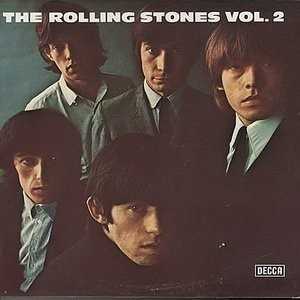 | Album: 1 of 25 Title: The Rolling Stones No. 2 Released: 1964 Tracks: 12 Duration: 37:03 Scroll: Up Down Top Bottom 25% 50% 75% Spotify Allmusic AlbumCover | 1 Everybody Needs Somebody to Love (05:04) 2 Down Home Girl (04:15) 3 You Can’t Catch Me (03:39) 4 Time Is on My Side (02:58) 5 What a Shame (03:04) 6 Grown Up Wrong (02:08) 7 Down the Road Apiece (02:57) 8 Under the Boardwalk (02:49) 9 I Can’t Be Satisfied (03:28) 10 Pain in My Heart (02:14) 11 Off the Hook (02:35) 12 Susie Q (01:49) |
| The Rolling Stones No. 2 : Allmusic album Review : The groups second British album actually appeared after their second U.S. LP, mostly owing to the fact that the British rock & roll audience wasnt focused on the long-player as a medium (singles and EPs were the driving force of the business in England then). It uses the same David Bailey cover shot that had graced the U.S.-issued 12 X 5 album two and a half months earlier, but only four songs -- "Under the Boardwalk," "Suzie Q," "Grown Up Wrong," and "Time Is on My Side" -- overlap on the two albums. Rather, Rolling Stones No. 2 offered seven songs that werent to make it out in America until four months later on The Rolling Stones Now!, and theyre all solid numbers: "Off the Hook," "Everybody Needs Somebody to Love," "Down Home Girl," "You Cant Catch Me," "What a Shame," "Pain in My Heart," and "Down the Road Apiece," plus one of the groups best blues covers, their version of Muddy Waters "I Cant Be Satisfied," which wasnt released in America until 1973 and features some killer slide playing by Brian Jones. The U.K. LP also had the advantage of only being released in mono, so there are no "rechanneled stereo" copies with which to concern oneself. | ||
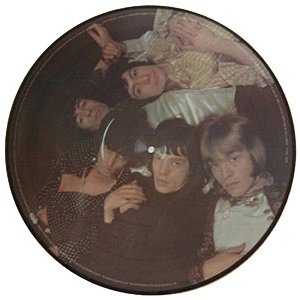 | Album: 2 of 25 Title: The Rolling Stones Released: 1964-04-17 Tracks: 12 Duration: 31:03 Scroll: Up Down Top Bottom 25% 50% 75% Spotify Allmusic AlbumCover | 1 Not Fade Away (01:49) 2 Route 66 (02:22) 3 I Just Want to Make Love to You (02:16) 4 Honest I Do (02:11) 5 Now I’ve Got a Witness (Like Uncle Phil and Uncle Gene) (02:31) 6 Little by Little (02:39) 7 I’m a King Bee (02:37) 8 Carol (02:35) 9 Tell Me (You’re Coming Back) (03:50) 10 Can I Get a Witness (02:58) 11 You Can Make It If You Try (02:03) 12 Walking the Dog (03:09) |
| The Rolling Stones : Allmusic album Review : The British version of the Stones first album has a nearly identical cover to its American equivalent, issued six weeks later, but a slightly different song lineup. Among these 12 songs, absent is "Not Fade Away," which was a hit single in England (where singles and LPs were usually kept separate), and in its place is the Stones cover of Bo Diddleys "Mona (I Need You Baby)" (credited here as "I Need You Baby"), which had to wait until Rolling Stones Now!, a year later, for its U.S. release. Its not a big switch, a Bo Diddley-style cover of a Buddy Holly song bumping an actual Bo Diddley cover on the U.S. version. Otherwise, the main difference lies in the version of "Tell Me" included here, which sounds about two generations hotter than any edition of the song ever released in the U.S. -- its the long version, with the break that was cut from the single, but the British LP and the original late-80s Decca U.K. compact disc (820 047-2) both contain a version without any fade, running the better part of a minute longer than the U.S. release of the song, until the band literally stops playing. | ||
 | Album: 3 of 25 Title: 12 × 5 Released: 1964-10-24 Tracks: 12 Duration: 31:09 Scroll: Up Down Top Bottom 25% 50% 75% Spotify Allmusic AlbumCover | 1 Around and Around (03:06) 2 Confessin’ the Blues (02:51) 3 Empty Heart (02:40) 4 Time Is on My Side (02:58) 5 Good Times, Bad Times (02:32) 6 It’s All Over Now (03:27) 7 2120 South Michigan Avenue (02:10) 8 Under the Boardwalk (02:49) 9 Congratulations (02:29) 10 Grown Up Wrong (02:08) 11 If You Need Me (02:06) 12 Susie Q (01:49) |
| 12 × 5 : Allmusic album Review : The evolution from blues to rock accelerated with the Rolling Stones second American LP. They turned soul into guitar rock for the hits "Its All Over Now" and "Time Is on My Side" (the latter of which was their first American Top Ten single). "2120 South Michigan Avenue" is a great instrumental blues-rock jam; "Around and Around" is one of their best Chuck Berry covers; and "If You Need Me" reflects an increasing contemporary soul influence. On the other hand, the group originals (except for the propulsive "Empty Heart") are weak and derivative, indicating that the band still had a way to go before it could truly challenge the Beatles throne. | ||
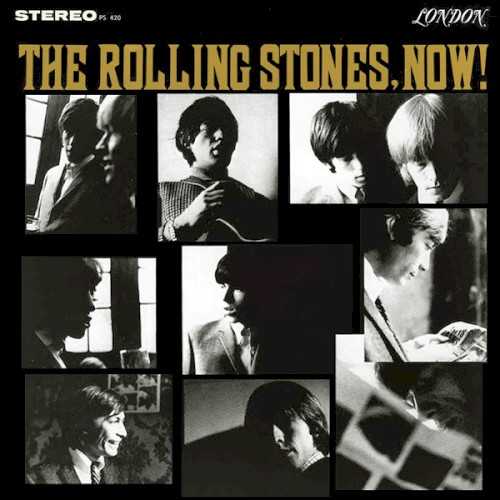 | Album: 4 of 25 Title: The Rolling Stones, Now! Released: 1965-02-13 Tracks: 12 Duration: 36:03 Scroll: Up Down Top Bottom 25% 50% 75% Spotify Allmusic AlbumCover | 1 Everybody Needs Somebody to Love (03:01) 2 Down Home Girl (04:15) 3 You Can’t Catch Me (03:39) 4 Heart of Stone (02:48) 5 What a Shame (03:04) 6 Mona (I Need You Baby) (03:37) 7 Down the Road Apiece (03:01) 8 Off the Hook (02:35) 9 Pain in My Heart (02:14) 10 Oh Baby (We Got a Good Thing Goin’) (02:12) 11 Little Red Rooster (03:05) 12 Surprise Surprise (02:30) |
| The Rolling Stones, Now! : Allmusic album Review : Although their third American album was patched together (in the usual British Invasion tradition) from a variety of sources, its their best early R&B-oriented effort. Most of the Stones early albums suffer from three or four very weak cuts; Now! is almost uniformly strong start-to-finish, the emphasis on some of their blackest material. The covers of "Down Home Girl," Bo Diddleys vibrating "Mona," Otis Reddings "Pain in My Heart," and Barbara Lynns "Oh Baby" are all among the groups best R&B interpretations. The best gem is "Little Red Rooster," a pure blues with wonderful slide guitar from Brian Jones (and a number one single in Britain, although it was only an album track in the U.S.). As songwriters, Jagger and Richards are still struggling, but they come up with one of their first winners (and an American Top 20 hit) with the yearning, soulful "Heart of Stone." | ||
 | Album: 5 of 25 Title: Out of Our Heads Released: 1965-07-30 Tracks: 12 Duration: 29:37 Scroll: Up Down Top Bottom 25% 50% 75% Spotify Allmusic AlbumCover | 1 She Said Yeah (01:36) 2 Mercy, Mercy (02:47) 3 Hitch Hike (02:26) 4 That’s How Strong My Love Is (02:26) 5 Good Times (02:00) 6 Gotta Get Away (02:07) 7 Talkin’ ’Bout You (02:32) 8 Cry to Me (03:10) 9 Oh Baby (02:10) 10 Heart of Stone (02:48) 11 The Under Assistant West Coast Promotion Man (03:09) 12 I’m Free (02:24) |
| Out of Our Heads : Allmusic album Review : In 1965, the Stones finally proved themselves capable of writing classic rock singles that mined their R&B/blues roots, but updated them into a more guitar-based, thoroughly contemporary context. The first enduring Jagger-Richards classics are here -- "The Last Time," its menacing, folky B-side "Play With Fire," and the riff-driven "Satisfaction," which made them superstars in the States and defined their sound and rebellious attitude better than any other single song. On the rest of the album, they largely opted for mid-60s soul covers, Marvin Gayes "Hitch Hike," Solomon Burkes "Cry to Me," and Sam Cookes "Good Times" being particular standouts. "Im All Right" (based on a Bo Diddley sound) showed their 1965 sound at its rawest, and there are a couple of fun, though derivative, bluesy originals in "The Spider and the Fly" and "The Under Assistant West Coast Promotion Man." | ||
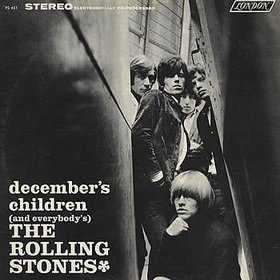 | Album: 6 of 25 Title: December’s Children (and Everybody’s) Released: 1965-12-04 Tracks: 12 Duration: 29:32 Scroll: Up Down Top Bottom 25% 50% 75% Allmusic AlbumCover | 1 She Said Yeah (01:36) 2 Talkin’ About You (02:36) 3 You Better Move On (02:41) 4 Look What You’ve Done (02:20) 5 The Singer Not the Song (02:26) 6 Route 66 (live) (02:42) 7 Get Off of My Cloud (02:56) 8 I’m Free (02:24) 9 As Tears Go By (02:45) 10 Gotta Get Away (02:10) 11 Blue Turns to Grey (02:35) 12 I’m Moving On (02:19) |
| December’s Children (and Everybody’s) : Allmusic album Review : The last Stones album in which cover material accounted for 50 percent of the content was thrown together from a variety of singles, British LP tracks, outtakes, and a cut from an early 1964 U.K. EP. Haphazard assembly aside, much of its great, including the huge hit "Get Off of My Cloud" and the controversial, string-laden acoustic ballad "As Tears Go By" (a Top Ten item in America). Raiding the R&B closet for the last time, they also offered a breathless run-through of Larry Williams "She Said Yeah," a sultry Chuck Berry cover ("Talkin About You"), and exciting live versions of "Route 66" and Hank Snows "Im Moving On." More importantly, Jagger-Richards songwriting partnership had now developed to the extent that several non-A-side tracks were reasonably strong in their own right, such as "Im Free" and "The Singer Not the Song." And the version of "You Better Move On" (which had been featured on a British EP at the beginning of 1964) was one of their best and most tender soul covers. | ||
 | Album: 7 of 25 Title: Aftermath Released: 1966-04-15 Tracks: 11 Duration: 43:04 Scroll: Up Down Top Bottom 25% 50% 75% Spotify Allmusic AlbumCover | 1 Paint It, Black (03:23) 2 Stupid Girl (02:55) 3 Lady Jane (03:10) 4 Under My Thumb (03:42) 5 Doncha Bother Me (02:42) 6 Think (03:10) 7 Flight 505 (03:29) 8 High and Dry (03:10) 9 It’s Not Easy (02:56) 10 I Am Waiting (03:12) 11 Going Home (11:13) |
| Aftermath : Allmusic album Review : The Rolling Stones finally delivered a set of all-original material with this LP, which also did much to define the group as the bad boys of rock & roll with their sneering attitude toward the world in general and the female sex in particular. The borderline misogyny could get a bit juvenile in tunes like "Stupid Girl." But on the other hand the group began incorporating the influences of psychedelia and Dylan into their material with classics like "Paint It Black," an eerily insistent number one hit graced by some of the best use of sitar (played by Brian Jones) on a rock record. Other classics included the jazzy "Under My Thumb," where Jones added exotic accents with his vibes, and the delicate Elizabethan ballad "Lady Jane," where dulcimer can be heard. Some of the material is fairly ho-hum, to be honest, as Mick Jagger and Keith Richards were still prone to inconsistent songwriting; "Goin Home," an 11-minute blues jam, was remarkable more for its barrier-crashing length than its content. Look out for an obscure gem, however, in the brooding, meditative "I Am Waiting." | ||
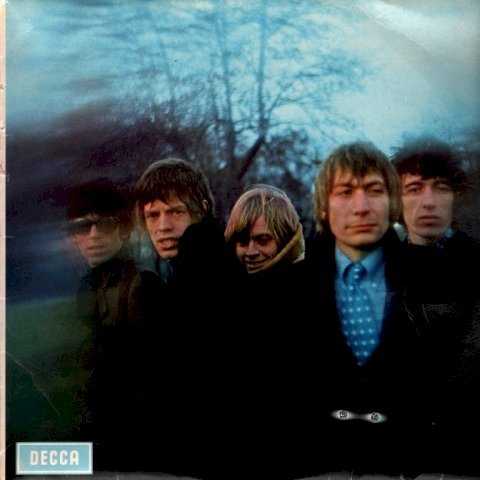 | Album: 8 of 25 Title: Between the Buttons Released: 1967-01-20 Tracks: 12 Duration: 38:28 Scroll: Up Down Top Bottom 25% 50% 75% Spotify Wikipedia Allmusic AlbumCover | 1 Let’s Spend the Night Together (03:38) 2 Yesterday’s Papers (02:04) 3 Ruby Tuesday (03:18) 4 Connection (02:10) 5 She Smiled Sweetly (02:45) 6 Cool, Calm & Collected (04:14) 7 All Sold Out (02:17) 8 My Obsession (03:18) 9 Who’s Been Sleeping Here? (03:51) 10 Complicated (03:12) 11 Miss Amanda Jones (02:44) 12 Something Happened to Me Yesterday (04:54) |
| Between the Buttons : Allmusic album Review : The Rolling Stones 1967 recordings are a matter of some controversy; many critics felt that they were compromising their raw, rootsy power with trendy emulations of the Beatles, Kinks, Dylan, and psychedelic music. Approach this album with an open mind, though, and youll find it to be one of their strongest, most eclectic LPs, with many fine songs that remain unknown to all but Stones devotees. The lyrics are getting better (if more savage), and the arrangements more creative, on brooding near-classics like "All Sold Out," "My Obsession," and "Yesterdays Papers." "She Smiled Sweetly" shows their hidden romantic side at its best, while "Connection" is one of the records few slabs of conventionally driving rock. The best tracks on the American edition were the two songs that gave the group a double-sided number one in early 1967: the lustful "Lets Spend the Night Together" and the beautiful, melancholy "Ruby Tuesday," which is as melodic as anything Mick Jagger and Keith Richards would ever write. | ||
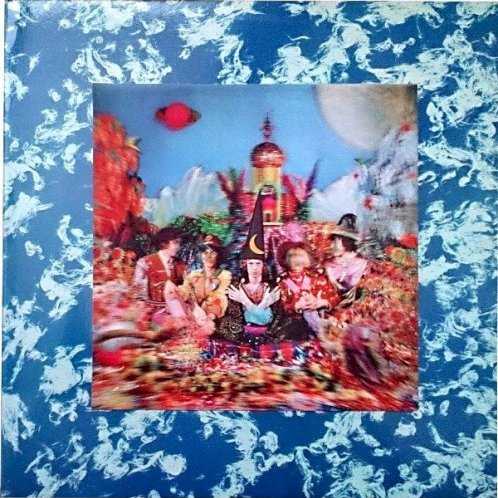 | Album: 9 of 25 Title: Their Satanic Majesties Request Released: 1967-12-08 Tracks: 10 Duration: 44:16 Scroll: Up Down Top Bottom 25% 50% 75% Spotify Allmusic AlbumCover | 1 Sing This All Together (03:47) 2 Citadel (02:51) 3 In Another Land (03:13) 4 2000 Man (03:08) 5 Sing This All Together (See What Happens) (07:56) 6 [Cosmic Christmas] / She’s a Rainbow (05:18) 7 The Lantern (04:24) 8 Gomper (05:09) 9 2000 Light Years From Home (04:47) 10 On With the Show (03:40) |
| Their Satanic Majesties Request : Allmusic album Review : Without a doubt, no Rolling Stones album -- and, indeed, very few rock albums from any era -- split critical opinion as much as the Rolling Stones psychedelic outing. Many dismiss the record as sub-Sgt. Pepper posturing; others confess, if only in private, to a fascination with the albums inventive arrangements, which incorporated some African rhythms, Mellotrons, and full orchestration. Whats clear is that never before or after did the Stones take so many chances in the studio. (Some critics and fans feel that the record has been unfairly undervalued, partly because purists expect the Stones to constantly champion a blues n raunch worldview.) About half the material is very strong, particularly the glorious "Shes a Rainbow," with its beautiful harmonies, piano, and strings; the riff-driven "Citadel"; the hazy, dreamlike "In Another Land," Bill Wymans debut writing (and singing) credit on a Stones release; and the majestically dark and doomy cosmic rocker "2000 Light Years from Home," with some of the creepiest synthesizer effects (devised by Brian Jones) ever to grace a rock record. The downfall of the album was caused by some weak songwriting on the lesser tracks, particularly the interminable psychedelic jam "Sing This All Together (See What Happens)." Its a much better record than most people give it credit for being, though, with a strong current of creeping uneasiness that undercuts the gaudy psychedelic flourishes. In 1968, the Stones would go back to the basics, and never wander down these paths again, making this all the more of a fascinating anomaly in the groups discography. | ||
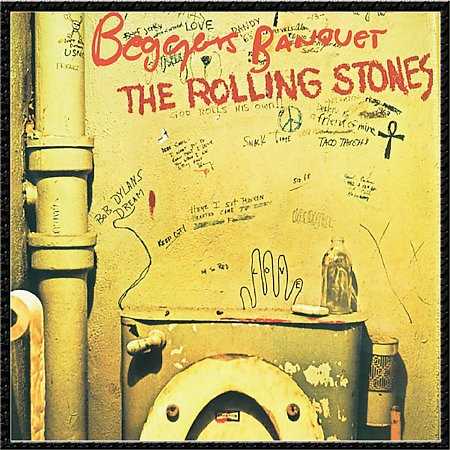 | Album: 10 of 25 Title: Beggars Banquet Released: 1968-12-06 Tracks: 10 Duration: 39:59 Scroll: Up Down Top Bottom 25% 50% 75% Spotify Allmusic AlbumCover | 1 Sympathy for the Devil (06:18) 2 No Expectations (03:57) 3 Dear Doctor (03:22) 4 Parachute Woman (02:20) 5 Jigsaw Puzzle (06:17) 6 Street Fighting Man (03:16) 7 Prodigal Son (02:52) 8 Stray Cat Blues (04:37) 9 Factory Girl (02:09) 10 Salt of the Earth (04:47) |
| Beggars Banquet : Allmusic album Review : The Stones forsook psychedelic experimentation to return to their blues roots on this celebrated album, which was immediately acclaimed as one of their landmark achievements. A strong acoustic Delta blues flavor colors much of the material, particularly "Salt of the Earth" and "No Expectations," which features some beautiful slide guitar work. Basic rock & roll was not forgotten, however: "Street Fighting Man," a reflection of the political turbulence of 1968, was one of their most innovative singles, and "Sympathy for the Devil," with its fire-dancing guitar licks, leering Jagger vocals, African rhythms, and explicitly satanic lyrics, was an image-defining epic. On "Stray Cat Blues," Jagger and crew began to explore the kind of decadent sexual sleaze that they would take to the point of self-parody by the mid-70s. At the time, though, the approach was still fresh, and the lyrical bite of most of the material ensured Beggars Banquets place as one of the top blues-based rock records of all time. | ||
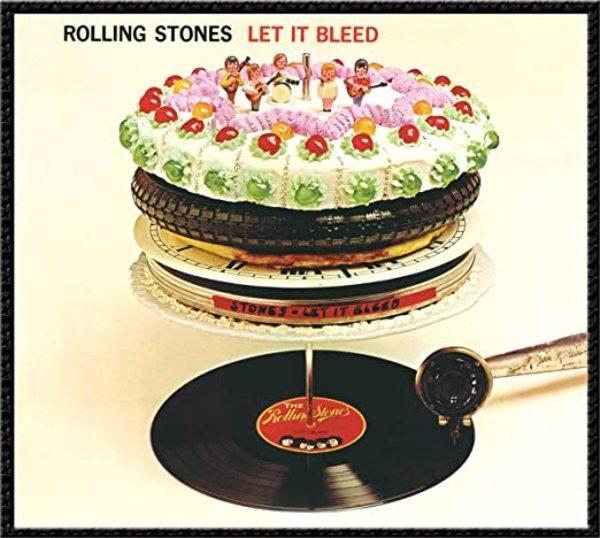 | Album: 11 of 25 Title: Let It Bleed Released: 1969-11-29 Tracks: 9 Duration: 42:25 Scroll: Up Down Top Bottom 25% 50% 75% Spotify Allmusic AlbumCover | 1 Gimme Shelter (04:32) 2 Love in Vain (04:19) 3 Country Honk (03:07) 4 Live With Me (03:33) 5 Let It Bleed (05:28) 6 Midnight Rambler (06:52) 7 You Got the Silver (02:50) 8 Monkey Man (04:11) 9 You Can’t Always Get What You Want (07:29) |
| Let It Bleed : Allmusic album Review : Mostly recorded without Brian Jones -- who died several months before its release (although he does play on two tracks) and was replaced by Mick Taylor (who also plays on just two songs) -- this extends the rock and blues feel of Beggars Banquet into slightly harder-rocking, more demonically sexual territory. The Stones were never as consistent on album as their main rivals, the Beatles, and Let It Bleed suffers from some rather perfunctory tracks, like "Monkey Man" and a countrified remake of the classic "Honky Tonk Woman" (here titled "Country Honk"). Yet some of the songs are among their very best, especially "Gimme Shelter," with its shimmering guitar lines and apocalyptic lyrics; the harmonica-driven "Midnight Rambler"; the druggy party ambience of the title track; and the stunning "You Cant Always Get What You Want," which was the Stones "Hey Jude" of sorts, with its epic structure, horns, philosophical lyrics, and swelling choral vocals. "You Got the Silver" (Keith Richards first lead vocal) and Robert Johnsons "Love in Vain," by contrast, were as close to the roots of acoustic down-home blues as the Stones ever got. | ||
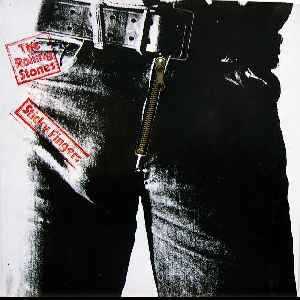 | Album: 12 of 25 Title: Sticky Fingers Released: 1971-04-23 Tracks: 10 Duration: 43:20 Scroll: Up Down Top Bottom 25% 50% 75% Spotify TrackSamples Allmusic AlbumCover | 1 Brown Sugar (03:49) 2 Sway (03:52) 3 Wild Horses (05:43) 4 Can’t You Hear Me Knocking (07:15) 5 You Gotta Move (02:33) 6 Bitch (03:38) 7 I Got the Blues (03:54) 8 Let It Rock (Brown Sugar B-Side, original mono mix) (02:32) 9 Dead Flowers (04:05) 10 Moonlight Mile (05:55) |
| Sticky Fingers : Allmusic album Review : Pieced together from outtakes and much-labored-over songs, Sticky Fingers manages to have a loose, ramshackle ambience that belies both its origins and the dark undercurrents of the songs. Its a weary, drug-laden album -- well over half the songs explicitly mention drug use, while the others merely allude to it -- that never fades away, but it barely keeps afloat. Apart from the classic opener, "Brown Sugar" (a gleeful tune about slavery, interracial sex, and lost virginity, not necessarily in that order), the long workout "Cant You Hear Me Knocking" and the mean-spirited "Bitch," Sticky Fingers is a slow, bluesy affair, with a few country touches thrown in for good measure. The laid-back tone of the album gives ample room for new lead guitarist Mick Taylor to stretch out, particularly on the extended coda of "Cant You Hear Me Knocking." But the key to the album isnt the instrumental interplay -- although that is terrific -- its the utter weariness of the songs. "Wild Horses" is their first non-ironic stab at a country song, and it is a beautiful, heart-tugging masterpiece. Similarly, "I Got the Blues" is a ravished, late-night classic that ranks among their very best blues. "Sister Morphine" is a horrifying overdose tale, and "Moonlight Mile," with Paul Buckmasters grandiose strings, is a perfect closure: sad, yearning, drug-addled, and beautiful. With its offhand mixture of decadence, roots music, and outright malevolence, Sticky Fingers set the tone for the rest of the decade for the Stones. | ||
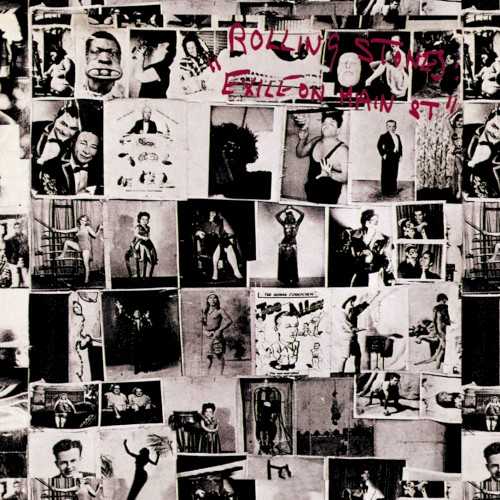 | Album: 13 of 25 Title: Exile on Main St. Released: 1972-05-12 Tracks: 18 Duration: 1:07:17 Scroll: Up Down Top Bottom 25% 50% 75% Spotify Allmusic AlbumCover | 1 Rocks Off (04:33) 2 Rip This Joint (02:23) 3 Shake Your Hips (02:59) 4 Casino Boogie (03:34) 5 Tumbling Dice (03:47) 6 Sweet Virginia (04:26) 7 Torn and Frayed (04:18) 8 Sweet Black Angel (02:58) 9 Loving Cup (04:25) 10 Happy (03:05) 11 Turd on the Run (02:38) 12 Ventilator Blues (03:24) 13 I Just Want to See His Face (02:53) 14 Let It Loose (05:18) 15 All Down the Line (03:50) 16 Stop Breaking Down (04:34) 17 Shine a Light (04:17) 18 Soul Survivor (03:49) |
| Exile on Main St. : Allmusic album Review : Greeted with decidedly mixed reviews upon its original release, Exile on Main St. has become generally regarded as the Rolling Stones finest album. Part of the reason why the record was initially greeted with hesitant reviews is that it takes a while to assimilate. A sprawling, weary double album encompassing rock & roll, blues, soul, and country, Exile doesnt try anything new on the surface, but the substance is new. Taking the bleakness that underpinned Let It Bleed and Sticky Fingers to an extreme, Exile is a weary record, and not just lyrically. Jaggers vocals are buried in the mix, and the music is a series of dark, dense jams, with Keith Richards and Mick Taylor spinning off incredible riffs and solos. And the songs continue the breakthroughs of their three previous albums. No longer does their country sound forced or kitschy -- its lived-in and complex, just like the groups forays into soul and gospel. While the songs, including the masterpieces "Rocks Off," "Tumbling Dice," "Torn and Frayed," "Happy," "Let It Loose," and "Shine a Light," are all terrific, they blend together, with only certain lyrics and guitar lines emerging from the murk. Its the kind of record thats gripping on the very first listen, but each subsequent listen reveals something new. Few other albums, let alone double albums, have been so rich and masterful as Exile on Main St., and it stands not only as one of the Stones best records, but sets a remarkably high standard for all of hard rock. | ||
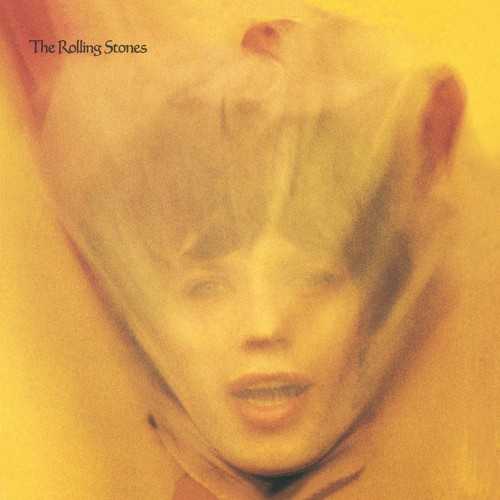 | Album: 14 of 25 Title: Goats Head Soup Released: 1973-08-31 Tracks: 10 Duration: 46:47 Scroll: Up Down Top Bottom 25% 50% 75% Spotify TrackSamples Allmusic AlbumCover | 1 Dancing With Mr. D. (04:51) 2 100 Years Ago (03:57) 3 Coming Down Again (05:54) 4 Doo Doo Doo Doo Doo (Heartbreaker) (03:27) 5 Angie (04:32) 6 Silver Train (04:27) 7 Hide Your Love (04:12) 8 Winter (05:30) 9 Can You Hear the Music (05:31) 10 Star Star (04:26) |
| Goats Head Soup : Allmusic album Review : Sliding out of perhaps the greatest winning streak in rock history, the Stones slipped into decadence and rock star excess with Goats Head Soup, their sequel to Exile on Main St. This is where the Stones image began to eclipse their accomplishments, as Mick ascended to jet-setting celebrity and Keith slowly sunk deeper into addiction, and its possible hearing them moving in both directions on Goats Head Soup, at times in the same song. As Jagger plays the devil (or, dances with Mr. D, as he likes to say), the sex and sleaze quotient is increased, all of it underpinned by some genuinely affecting heartbreak, highlighted by "Angie." This may not be as downright funky, freaky, and fantastic as Exile, yet the extra layer of gloss brings out the enunciated lyrics, added strings, wah-wah guitars, explicit sex, and violence, making it all seem trippily decadent. If it doesnt seem like theres a surplus of classics here, all the songs work well, illustrating just how far theyve traveled in their songcraft, as well as their exceptional talent as a band -- they make this all sound really easy and darkly alluring, even when the sexnsatanism seems a little silly. To top it all of, they cap off this utterly excessive album with "Star Star," a nasty Chuck Berry rip that grooves on its own mean vulgarity -- its real title is "Starf*cker," if you need any clarification, and even though they got nastier (the entirety of Undercover, for instance), they never again made something this dirty or nasty. And, it never feels more at home than it does at the end of this excessive record. | ||
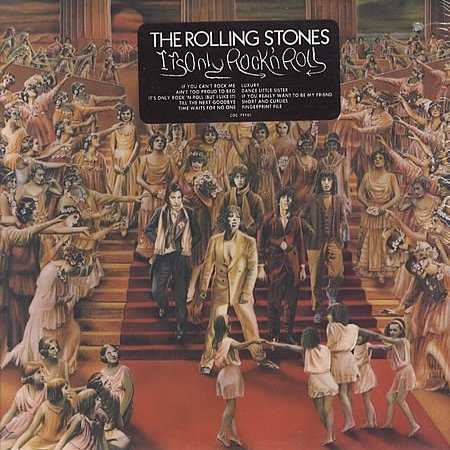 | Album: 15 of 25 Title: It’s Only Rock ’n Roll Released: 1974-10-16 Tracks: 10 Duration: 48:42 Scroll: Up Down Top Bottom 25% 50% 75% Spotify TrackSamples Allmusic AlbumCover | 1 If You Can’t Rock Me (03:48) 2 Ain’t Too Proud to Beg (03:33) 3 It’s Only Rock ’n’ Roll (05:08) 4 Till the Next Goodbye (04:38) 5 Time Waits for No One (06:38) 6 Luxury (05:03) 7 Dance Little Sister (04:13) 8 If You Really Want to Be My Friend (06:18) 9 Short and Curlies (02:45) 10 Fingerprint File (06:33) |
| It’s Only Rock ’n Roll : Allmusic album Review : Its uneven, but at times Its Only Rock n Roll catches fire. The songs and performances are stronger than those on Goats Head Soup; the tossed-off numbers sound effortless, not careless. Throughout, the Stones wear their title as the "Worlds Greatest Rock & Roll Band" with a defiant smirk, which makes the bitter cynicism of "If You Cant Rock Me" and the title track all the more striking, and the reggae experimentation of "Luxury," the aching beauty of "Time Waits for No One," and the agreeable filler of "Dance Little Sister" and "Short and Curlies" all the more enjoyable. | ||
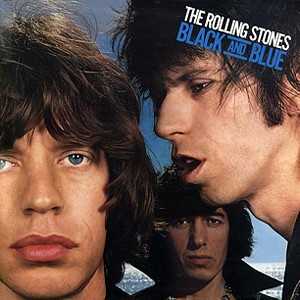 | Album: 16 of 25 Title: Black and Blue Released: 1976-04-23 Tracks: 8 Duration: 41:24 Scroll: Up Down Top Bottom 25% 50% 75% Spotify Wikipedia Allmusic AlbumCover | 1 Hot Stuff (05:21) 2 Hand of Fate (04:27) 3 Cherry Oh Baby (03:57) 4 Memory Motel (07:09) 5 Hey Negrita (04:59) 6 Melody (05:49) 7 Fool to Cry (05:05) 8 Crazy Mama (04:34) |
| Black and Blue : Allmusic album Review : The Rolling Stones recorded Black and Blue while auditioning Mick Taylors replacement, so its unfair to criticize it, really, for being longer on grooves and jams than songs, especially since thats whats good about it. Yes, the two songs that are undeniable highlights are "Memory Motel" and "Fool to Cry," the albums two ballads and, therefore, the two that had to be written and arranged, not knocked out in the studio; theyre also the ones that dont quite make as much sense, though they still work in the context of the record. No, this is all about groove and sound, as the Stones work Ron Wood into their fabric. And the remarkable thing is, apart from "Hand of Fate" and "Crazy Mama," theres little straight-ahead rock & roll here. They play with reggae extensively, funk and disco less so, making both sound like integral parts of the Stones lifeblood. Apart from the ballads, there might not be many memorable tunes, but there are times that you listen to the Stones just to hear them play, and this is one of them. | ||
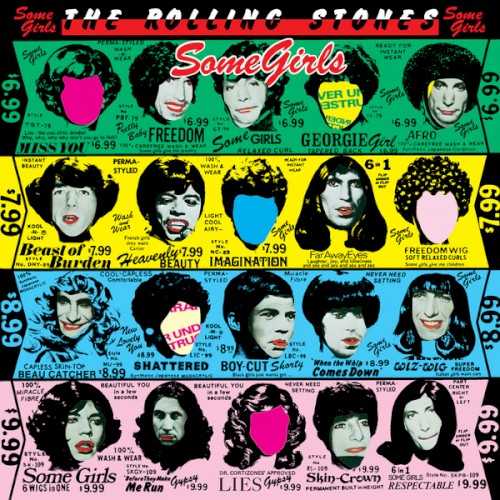 | Album: 17 of 25 Title: Some Girls Released: 1978-06-09 Tracks: 10 Duration: 40:44 Scroll: Up Down Top Bottom 25% 50% 75% Spotify TrackSamples Wikipedia Allmusic AlbumCover | 1 Miss You (04:48) 2 When the Whip Comes Down (04:21) 3 Just My Imagination (Running Away With Me) (04:38) 4 Some Girls (04:36) 5 Lies (03:11) 6 Far Away Eyes (04:23) 7 Respectable (03:07) 8 Before They Make Me Run (03:25) 9 Beast of Burden (04:25) 10 Shattered (03:47) |
| Some Girls : Allmusic album Review : During the mid-70s, the Rolling Stones remained massively popular, but their records suffered from Jaggers fascination with celebrity and Keiths worsening drug habit. By 1978, both punk and disco had swept the group off the front pages, and Some Girls was their fiery response to the younger generation. Opening with the disco-blues thump of "Miss You," Some Girls is a tough, focused, and exciting record, full of more hooks and energy than any Stones record since Exile on Main St. Even though the Stones make disco their own, they never quite take punk on their own ground. Instead, their rockers sound harder and nastier than they have in years. Using "Star Star" as a template, the Stones run through the seedy homosexual imagery of "When the Whip Comes Down," the bizarre, borderline-misogynistic vitriol of the title track, Keiths ultimate outlaw anthem, "Before They Make Me Run," and the decadent closer, "Shattered." In between, they deconstruct the Temptations "(Just My) Imagination," unleash the devastatingly snide country parody "Far Away Eyes," and contribute "Beast of Burden," one of their very best ballads. Some Girls may not have the back-street aggression of their 60s records, or the majestic, drugged-out murk of their early-70s work, but its brand of glitzy, decadent hard rock still makes it a definitive Stones album. | ||
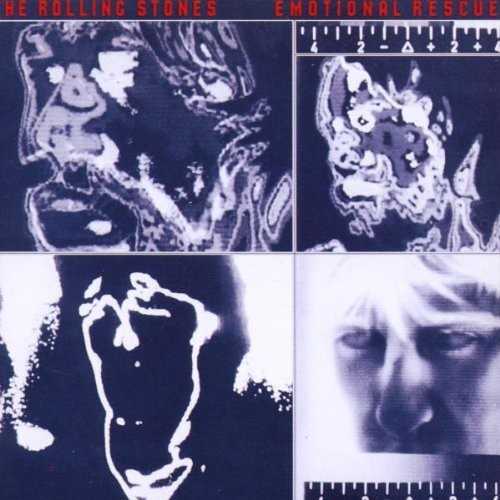 | Album: 18 of 25 Title: Emotional Rescue Released: 1980-06-23 Tracks: 10 Duration: 41:17 Scroll: Up Down Top Bottom 25% 50% 75% Spotify TrackSamples Wikipedia Allmusic AlbumCover | 1 Dance, Part 1 (04:23) 2 Summer Romance (03:16) 3 Send It to Me (03:43) 4 Let Me Go (03:52) 5 Indian Girl (04:23) 6 Where the Boys Go (03:28) 7 Down in the Hole (03:58) 8 Emotional Rescue (05:39) 9 She’s So Cold (04:13) 10 All About You (04:19) |
| Emotional Rescue : Allmusic album Review : Coasting on the success of Some Girls, the Stones offered more of the same on Emotional Rescue. Comprised of leftovers from the previous albums sessions and hastily written new numbers, Emotional Rescue may consist mainly of filler, but its expertly written and performed filler. The Stones toss off throwaways like the reggae-fueled, mail-order bride anthem "Send It to Me" or rockers like "Summer Romance" and "Where the Boys Go" with an authority that makes the record a guilty pleasure, even if its clear that only two songs -- the icy but sexy disco-rock of "Emotional Rescue" and the revamped Chuck Berry rocker "Shes So Cold" -- come close to being classic Stones. | ||
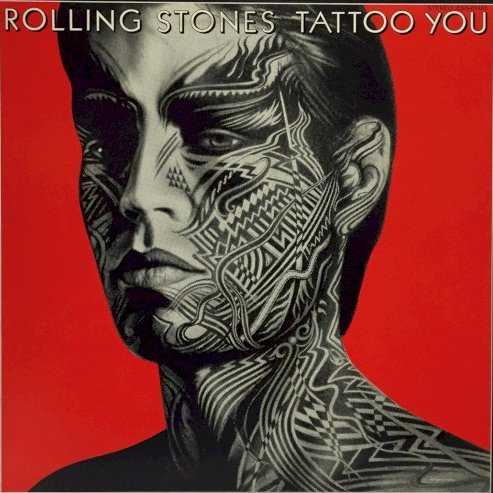 | Album: 19 of 25 Title: Tattoo You Released: 1981-08-18 Tracks: 11 Duration: 44:32 Scroll: Up Down Top Bottom 25% 50% 75% Spotify TrackSamples Allmusic AlbumCover | 1 Start Me Up (03:33) 2 Hang Fire (02:21) 3 Slave (06:32) 4 Little T & A (03:24) 5 Black Limousine (03:34) 6 Neighbours (03:33) 7 Worried About You (05:17) 8 Tops (03:48) 9 Heaven (04:22) 10 No Use in Crying (03:29) 11 Waiting on a Friend (04:35) |
| Tattoo You : Allmusic album Review : Like Emotional Rescue before it, Tattoo You was comprised primarily of leftovers, but unlike its predecessor, it never sounds that way. Instead, Tattoo You captures the Stones at their best as a professional stadium-rock band. Divided into a rock & roll side and a ballad side, the album delivers its share of thrills on the tight, dynamic first side. "Start Me Up" became the records definitive Stonesy rocker, but the frenzied doo wop of "Hang Fire," the reggae jam of "Slave," the sleazy Chuck Berry rockers "Little T&A" and "Neighbours," and the hard blues of "Black Limousine" are all terrific. The ballad side suffers in comparison, especially since "Heaven" and "No Use in Crying" are faceless. But "Worried About You" and "Tops" are effortless, excellent ballads, and "Waiting on a Friend," with its Sonny Rollins sax solo, is an absolute masterpiece, with a moving lyric that captures Jagger in a shockingly reflective and affecting state of mind. "Waiting on a Friend" and the vigorous rock & roll of the first side make Tattoo You an essential latter-day Stones album, ranking just a few notches below Some Girls. | ||
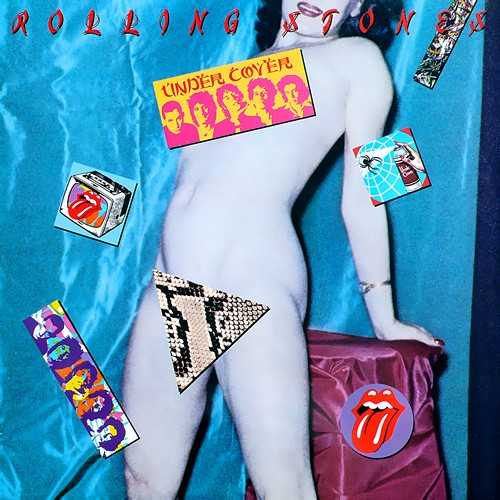 | Album: 20 of 25 Title: Undercover Released: 1983-11-07 Tracks: 10 Duration: 44:59 Scroll: Up Down Top Bottom 25% 50% 75% Spotify TrackSamples Wikipedia Allmusic AlbumCover | 1 Undercover of the Night (04:33) 2 She Was Hot (04:41) 3 Tie You Up (The Pain of Love) (04:16) 4 Wanna Hold You (03:52) 5 Feel On Baby (05:06) 6 Too Much Blood (06:14) 7 Pretty Beat Up (04:05) 8 Too Tough (03:51) 9 All the Way Down (03:14) 10 It Must Be Hell (05:04) |
| Undercover : Allmusic album Review : As the Rolling Stones most ambitious album since Some Girls, Undercover is a weird, wild mix of hard rock, new wave pop, reggae, dub, and soul. Even with all the careening musical eclecticism, what distinguishes Undercover is its bleak, nihilistic attitude -- its teeming with sickness, with violence, kinky sex, and loathing dripping from almost every song. "Undercover of the Night" slams with echoing guitars and rubbery basslines, as Jagger gives a feverish litany of sex, corruption, and suicide. It set the tone for the rest of the album, whether its the runaway nymphomaniac of "She Was Hot" or the ridiculous slasher imagery of "Too Much Blood." Only Keiths "Wanna Hold You" offers a reprieve from the carnage, and its relentless bloodletting makes the album a singularly fascinating listen. For some observers, that mixture was nearly too difficult to stomach, but for others, its a fascinating record, particularly since much of its nastiness feels as if the Stones, and Jagger and Richards in particular, are running out of patience with each other. | ||
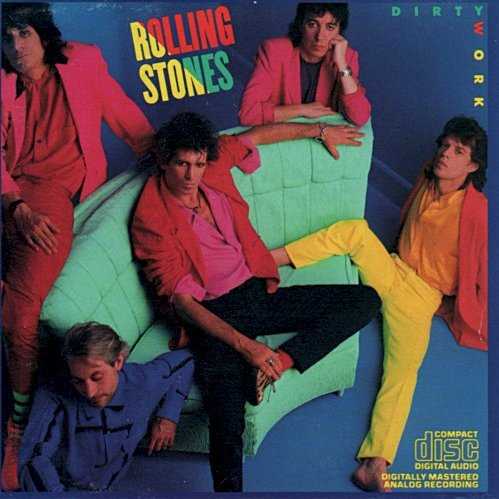 | Album: 21 of 25 Title: Dirty Work Released: 1986-03-21 Tracks: 11 Duration: 40:02 Scroll: Up Down Top Bottom 25% 50% 75% Spotify Wikipedia Allmusic AlbumCover | 1 One Hit (to the Body) (04:44) 2 Fight (03:10) 3 Harlem Shuffle (03:24) 4 Hold Back (03:53) 5 Too Rude (03:13) 6 Winning Ugly (04:33) 7 Back to Zero (04:00) 8 Dirty Work (03:53) 9 Had It With You (03:20) 10 Sleep Tonight (05:14) 11 Key to the Highway (00:33) |
| Dirty Work : Allmusic album Review : Reuniting after three years and one solo album from Mick Jagger, the Rolling Stones attempted to settle their differences and craft a comeback with Dirty Work, but the tensions remained too great for the group. Designed as a return to their rock & roll roots after several years of vague dance experiments, Dirty Work is hampered by uneven songs and undistinguished performances, as well as a slick, lightly synthesized production that instantly dates the album to the mid-80s. Jagger often sounds like hes saving his best work for his solo records, but a handful of songs have a spry, vigorous attack -- "One Hit (To the Body)" is a classic, and "Winning Ugly" and "Had It With You" have a similar aggression. Still, most of Dirty Work sounds as forced as the cover of Bob & Earls uptown soul obscurity "Harlem Shuffle," leaving the album as one of the groups most undistinguished efforts. | ||
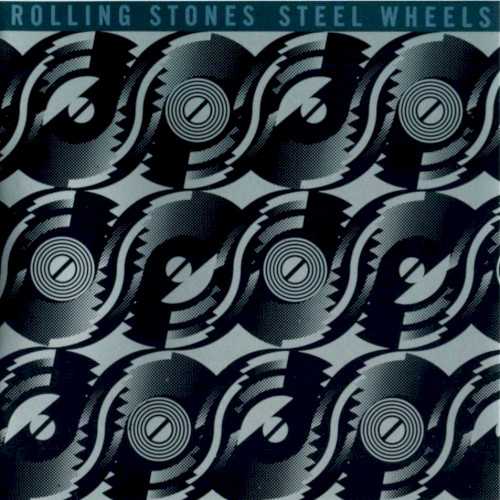 | Album: 22 of 25 Title: Steel Wheels Released: 1989-08-28 Tracks: 12 Duration: 53:03 Scroll: Up Down Top Bottom 25% 50% 75% Spotify TrackSamples Allmusic AlbumCover | 1 Sad Sad Sad (03:35) 2 Mixed Emotions (04:38) 3 Terrifying (04:53) 4 Hold On to Your Hat (03:32) 5 Hearts for Sale (04:41) 6 Blinded by Love (04:36) 7 Rock and a Hard Place (05:25) 8 Can’t Be Seen (04:10) 9 Almost Hear You Sigh (04:37) 10 Continental Drift (05:14) 11 Break the Spell (03:07) 12 Slipping Away (04:28) |
| Steel Wheels : Allmusic album Review : The Stones, or more accurately the relationship between Mick and Keith, imploded shortly after Dirty Work, resulting in Mick delivering a nearly unbearably mannered, ambitious solo effort that stiffed and Keith knocking out the greatest Stones album since Tattoo You, something that satisfied the cult but wasnt a hit. Clearly, they were worth more together than they were apart, so it was time for the reunion, and thats what Steel Wheels is -- a self-styled reunion album. It often feels as if they sat down and decided exactly what their audience wanted from a Stones album, and they deliver a record that gives the people what they want, whether its Tattoo You-styled rockers, ballads in the vein of "Fool to Cry," even a touch of old-fashioned experimentalism with "Continental Drift." Being professionals, in the business for over two and a half decades, and being a band that always favored calculation, they wear all this well, even if this lacks the vigor and menace that fuels the best singles; after all, the rocking singles ("Sad Sad Sad," "Rock and a Hard Place," "Mixed Emotions") wind up being smoked by such throwaways as "Hold on to Your Hat." Even though its just 12 songs, the record feels a little long, largely due to its lack of surprises and unabashed calculation (the jams are slicked up so much they dont have the visceral power of the jam record, Black and Blue). Still, the Stones sound good, and Mick and Keith both get off a killer ballad apiece with "Almost Hear You Sigh" and "Slipping Away," respectively. It doesnt make for a great Stones album, but its not bad, and it feels like a comeback -- which it was supposed to, after all. | ||
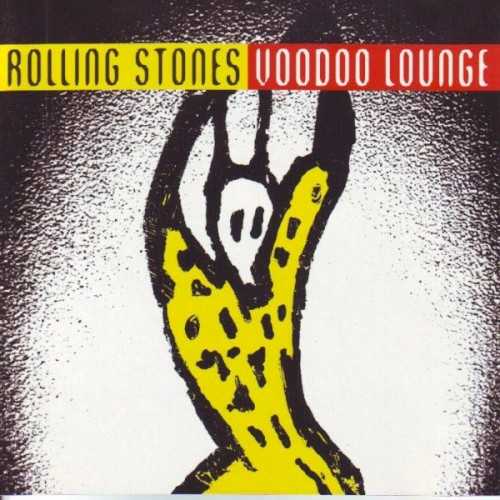 | Album: 23 of 25 Title: Voodoo Lounge Released: 1994-07-11 Tracks: 15 Duration: 1:02:06 Scroll: Up Down Top Bottom 25% 50% 75% Spotify Allmusic AlbumCover | 1 Love Is Strong (03:48) 2 You Got Me Rocking (03:35) 3 Sparks Will Fly (03:16) 4 The Worst (02:24) 5 New Faces (02:52) 6 Moon Is Up (03:42) 7 Out of Tears (05:27) 8 I Go Wild (04:23) 9 Brand New Car (04:15) 10 Sweethearts Together (04:45) 11 Suck on the Jugular (04:28) 12 Blinded by Rainbows (04:33) 13 Baby Break It Down (04:09) 14 Thru and Thru (06:15) 15 Mean Disposition (04:07) |
| Voodoo Lounge : Allmusic album Review : Funny that the much-touted "reunion/comeback" album Steel Wheels followed Dirty Work by just three years, while it took the Stones five years to turn out its sequel, Voodoo Lounge -- a time frame that seems much more appropriate for a "comeback." To pile on the irony, Voodoo Lounge feels more like a return to form than its predecessor, even if its every bit as calculated and Bill Wyman has flown the coup. With Don Was, a neo-classic rock producer who always attempts to reclaim his artists original claim to greatness, helming the boards with the Glimmer Twins, the Stones strip their sound back to its spare, hard-rocking basics. The Stones act in kind, turning out a set of songs that are pretty traditionalist. There are no new twists or turns in either the rockers or ballads (apart maybe from the quiet menace of "Thru and Thru," later used to great effect on The Sopranos), even if they revive some of the English folk and acoustic country-blues that was on Beggars Banquet. Still, this approach works because they are turning out songs that may not be classics but are first-rate examples of the value of craft. If this was released ten years, even five years earlier, this would be a near-triumph of classicist rock, but since Voodoo Lounge came out in the CD age, its padded out to 15 tracks, five of which could have been chopped to make the album much stronger. Instead, it runs on for nearly an hour, an ironically bloated length for an album whose greatest strengths are its lean, concentrated classic sound and songcraft. Still, it makes for a stronger record than its predecessor. | ||
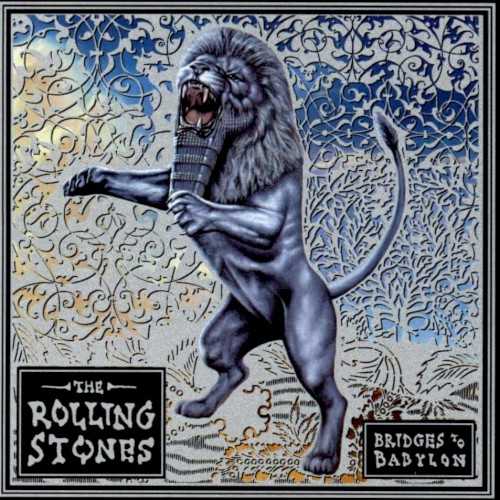 | Album: 24 of 25 Title: Bridges to Babylon Released: 1997-09-27 Tracks: 13 Duration: 1:02:18 Scroll: Up Down Top Bottom 25% 50% 75% Spotify Allmusic AlbumCover | 1 Flip the Switch (03:27) 2 Anybody Seen My Baby? (04:31) 3 Low Down (04:24) 4 Already Over Me (05:24) 5 Gunface (05:02) 6 You Don’t Have to Mean It (03:42) 7 Out of Control (04:43) 8 Saint of Me (05:14) 9 Might as Well Get Juiced (05:23) 10 Always Suffering (04:43) 11 Too Tight (03:32) 12 Thief in the Night (05:15) 13 How Can I Stop (06:54) |
| Bridges to Babylon : Allmusic album Review : Voodoo Lounge confirmed that the Stones could age gracefully, but it never sounded modern; it sounded classicist. With its successor, Bridges to Babylon, Mick Jagger was determined to bring the Rolling Stones into the 90s, albeit tentatively, and hired hip collaborators like the Dust Brothers (Beck, Beastie Boys) and Danny Saber (Black Grape) to give the veteran group an edge on their explorations of drum loops and samples. Of course, the Stones are the Stones, and no production is going to erase that, but the group is smart enough -- or Keith Richards is stubborn enough -- to work within its limitations and to have producer Don Was act as executive producer. As a result, Bridges to Babylon sounds like the Stones without sounding tired. The band is tight and energetic, and theres just enough flair to the sultry "Anybody Seen My Baby?," the menacing "Gunface," and the low-key, sleazy "Might as Well Get Juiced" to make them sound contemporary. But the real key to the success of Bridges to Babylon is the solid, craftsmanlike songwriting. While there arent any stunners on the album, nothing is bad, with rockers like "Flip the Switch" and "Low Down" sounding as convincing as ballads like "Already Over Me." And, as always, Keith contributes three winners -- including the reggae workout "You Dont Have to Mean It" and the slow-burning "How Can I Stop" -- that cap off another fine latter-day Stones record. | ||
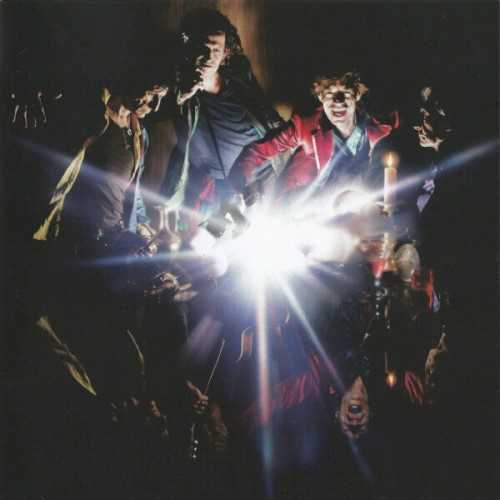 | Album: 25 of 25 Title: A Bigger Bang Released: 2005-06-09 Tracks: 16 Duration: 1:04:36 Scroll: Up Down Top Bottom 25% 50% 75% Spotify Allmusic AlbumCover | 1 Rough Justice (03:13) 2 Let Me Down Slow (04:17) 3 It Won’t Take Long (03:56) 4 Rain Fall Down (04:55) 5 Streets of Love (05:10) 6 Back of My Hand (03:33) 7 She Saw Me Coming (03:13) 8 Biggest Mistake (04:07) 1 This Place Is Empty (03:17) 2 Oh No, Not You Again (03:48) 3 Dangerous Beauty (03:48) 4 Laugh, I Nearly Died (04:55) 5 Sweet Neo Con (04:35) 6 Look What the Cat Dragged In (03:58) 7 Driving Too Fast (03:57) 8 Infamy (03:47) |
| A Bigger Bang : Allmusic album Review : Eight years separate 2005s A Bigger Bang, the Rolling Stones 24th album of original material, from its 1997 predecessor, Bridges to Babylon, the longest stretch of time between Stones albums in history, but unlike the three-year gap between 1986s Dirty Work and 1989s Steel Wheels, the band never really went away. They toured steadily, not just behind Bridges but behind the career-spanning 2002 compilation Forty Licks, and the steady activity paid off nicely, as the 2004 concert souvenir album Live Licks proved. The tight, sleek, muscular band showcased there was a surprise -- they played with a strength and swagger they hadnt had in years -- but a bigger surprise is that A Bigger Bang finds that reinvigorated band carrying its latter-day renaissance into the studio, turning in a sinewy, confident, satisfying album thats the bands best in years. Of course, every Stones album since their highly touted, self-conscious 1989 comeback, Steel Wheels, has been designed to get this kind of positive press, to get reviewers to haul out the cliché that this is their "best record since Exile on Main St." (Mick Jagger is so conscious of this, he deliberately compared Bigger Bang to Exile in all pre-release publicity and press, even if the scope and feel of Bang is very different from that 1972 classic), so its hard not to take any praise with a grain of salt, but there is a big difference between this album and 1994s Voodoo Lounge. That album was deliberately classicist, touching on all of the signatures of classic mid-period, late-60s/early-70s Stones -- reviving the folk, country, and straight blues that balanced their trademark rockers -- and while it was often successful, it very much sounded like the Stones trying to be the Stones. What distinguishes A Bigger Bang is that it captures the Stones simply being the Stones, playing without guest stars, not trying to have a hit, not trying to adopt the production style of the day, not doing anything but lying back and playing. Far from sounding like a lazy affair, the album rocks really hard, tearing out of the gate with "Rough Justice," the toughest, sleaziest, and flat-out best song Jagger and Richards have come up with in years. Its not a red herring, either -- "She Saw Me Coming," "Look What the Cat Dragged In," and the terrific "Oh No Not You Again," which finds Mick spitting out lyrics with venom and zeal, are equally as hard and exciting, but the album isnt simply a collection of rockers. The band delves into straight blues with "Back of My Hand," turns toward pop with "Let Me Down Slow," rides a disco groove reminiscent of "Emotional Rescue" on "Rain Fall Down," and has a number of ballads, highlighted by "Streets of Love" and Keiths late-night barroom anthem "This Place Is Empty," that benefit greatly from the stripped-down, uncluttered production by Don Was and the Glimmer Twins. Throughout the album, the interplay of the band is at the forefront, which is one of the reasons the record is so consistent: even the songs that drift toward the generic are redeemed by the sound of the greatest rock & roll band ever playing at a latter-day peak. And, make no mistake about it, the Stones sound better as a band than they have in years: theres an ease and assurance to their performances that are a joy to hear, whether theyre settling into a soulful groove or rocking harder than any group of 60-year-olds should. But A Bigger Bang doesnt succeed simply because the Stones are great musicians, it also works because this is a strong set of Jagger-Richards originals -- naturally, the songs dont rival their standards from the 60s and 70s, but the best songs here more than hold their own with the best of their post-Exile work, and there are more good songs here than on any Stones album since Some Girls. This may not be a startling comeback along the lines of Bob Dylans Love and Theft, but thats fine, because over the last three decades the Stones havent been about surprises: theyve been about reliability. The problem is, they havent always lived up to their promises, or when they did deliver the goods, it was sporadic and unpredictable. And thats whats unexpected about A Bigger Bang: they finally hold up their end of the bargain, delivering a strong, engaging, cohesive Rolling Stones album that finds everybody in prime form. Keith is loose and limber, Charlie is tight and controlled, Ronnie lays down some thrilling, greasy slide guitar, and Mick is having a grand time, making dirty jokes, baiting neo-cons, and sounding more committed to the Stones than he has in years. Best of all, this is a record where the band acknowledges its age and doesnt make a big deal about it: theyre not in denial, trying to act like a younger band, theyve simply accepted what they do best and go about doing it as if its no big deal. But thats what makes A Bigger Bang a big deal: its the Stones back in fighting form for the first time in years, and they have both the strength and the stamina to make the excellent latter-day effort everybodys been waiting for all these years. | ||